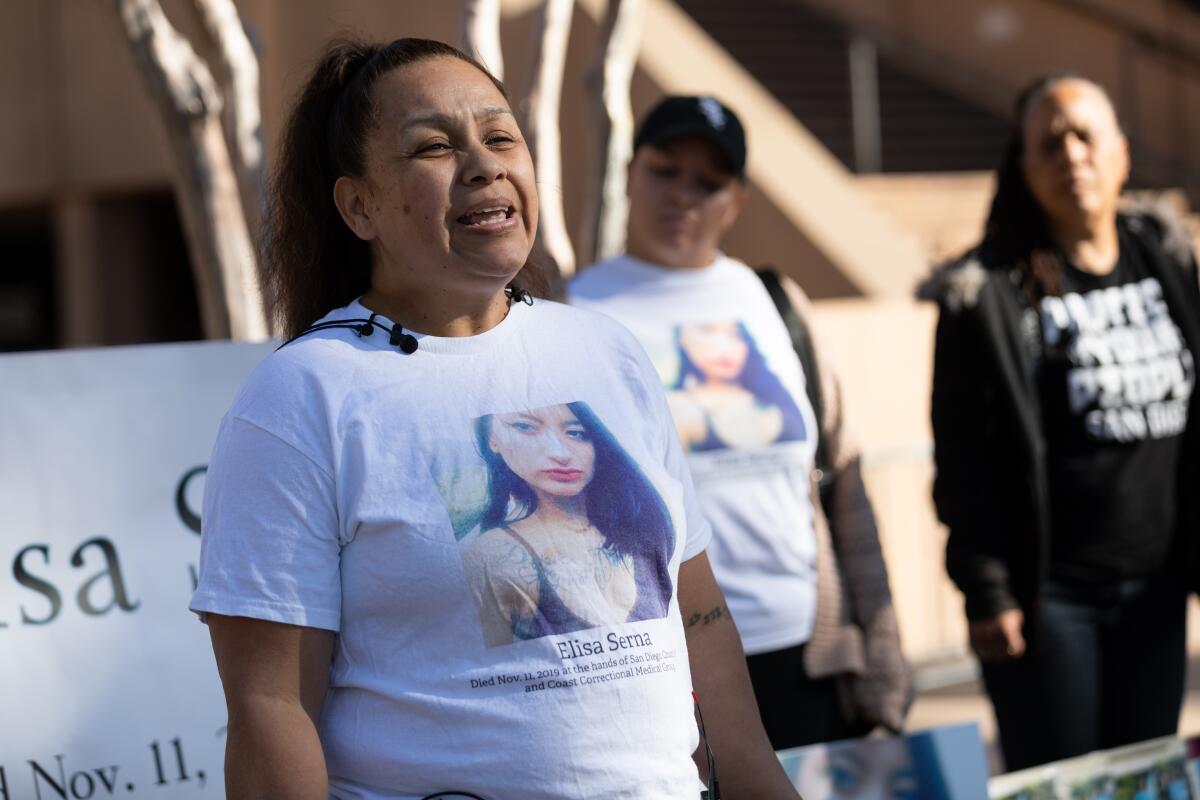Was death in San Diego County women’s jail a crime? Case against doctor, nurse begins

- Share via
SAN DIEGO — By every account, Elisa Serna died a horrible death, slumped alone on the floor of a Las Colinas women’s jail cell for an hour while San Diego County sheriff’s deputies and jail medical staff went about their business.
Now, nearly four years after Serna died in San Diego County custody, a nurse and doctor assigned to the jail will be fighting criminal charges in an El Cajon courtroom.
The long-delayed preliminary hearing that starts Monday will determine whether nurse Danalee Pascua and physician Friederike Von Lintig will proceed to trial on a single count each of involuntary manslaughter.
Both have pleaded not guilty to the allegation and face up to four years in state prison if convicted.
The case has already exposed some of the worst abuses in a county jail system that has seen hundreds of men and women die in custody since 2006, according to a state audit released last year and other independent reviews.
The Sheriff’s Department also has been repeatedly sued in civil court over deaths and serious injuries of people in its custody. In the last five years alone, taxpayers have spent more than $60 million to pay legal settlements, jury awards and excessive-force claims, records show.
Serna’s family is among those plaintiffs, although its lawsuit is still pending. They sued San Diego County in 2020, nearly a year after Serna died. Serna had been arrested five days earlier on suspicion of theft and drug-related charges.
“At the time of Elisa Serna’s death, there had been a long-standing custom and practice of improper and inadequate investigations; cover-up of misconduct; and failure to discipline and train deputies and medical staff,” the Serna family lawsuit alleged.
Relatives say the preliminary hearing in the criminal case, even this many years later, presents an opportunity to help fix a jail system badly in need of reform.
“Things could still be made right for Elisa,” said Paloma Serna, the deceased woman’s mother. She has become an activist working to improve San Diego County jails and plans to attend every day of the preliminary hearing.
“By us getting convictions for her death, I do believe it will open doors for future convictions and help bring charges to deputies and other medical staff that are accountable,” she said. “We can’t just keep ignoring that there’s a problem with San Diego County jails.”
Seen falling after seizure
The 24-year-old Serna, an admitted drug user suffering from heroin withdrawal, pneumonia and dehydration, struck her head on the wall after suffering a seizure and collapsing in her cell.
She was left alone after failing to respond to commands from a deputy and jail nurse who watched her fall, according to an independent investigation completed in 2021.

Serna was discovered an hour later, deceased, with rigor mortis setting in, the county Citizens’ Law Enforcement Review Board investigation found.
“Both Deputy 1 and the jail nurse exited Serna’s cell and closed the door behind them,” the February 2021 report said. “Serna subsequently died in the same position she was left in.”
Pascua, 38, a nurse employed by the county Health and Human Services Agency, was charged criminally later in 2021, almost two years to the day after Serna died.
Von Lintig, who is 58, was not charged until late last year, when Dist. Atty. Summer Stephan decided that she was criminally liable for the death as the physician on duty at the time.
“On or about November 11, 2019, Danalee de Los Santos Pascua and Friederike Von Lintig did unlawfully kill Elisa Serna, a human being, without malice but in the commission of a lawful act which might produce death in an unlawful manner and without due caution,” the criminal complaint states.
Neither of the attorneys representing the defendants would agree to discuss the case ahead of the preliminary hearing.
Both Pascua and Von Lintig remain properly licensed. Pascua holds valid state licenses as both a registered nurse and a public health nurse. Von Lintig retains a valid California Medical Board license as a physician and surgeon.
The district attorney’s office declined to comment on the case or explain in any detail why no deputies were charged.
“We cannot discuss our charging decisions, except to say that we can only file charges when we believe we can prove them beyond a reasonable doubt,” a spokesperson said in a statement.
But in announcing the manslaughter charge against Pascua in 2021, Stephan said the evidence showed that criminal negligence contributed to Serna’s death.
“There is nothing more sacred than the sanctity of life and when that life is in the custody and care of government, it must be safeguarded and provided with the appropriate medical care,” she said then.
Video evidence
Over the last 19 months, prosecutors have developed additional evidence that they think proves their cases against the nurse and physician, according to Paloma Serna.
Much of that includes Sheriff’s Department videotape from each of the five days Elisa Serna spent in custody, the grieving mother said.
“My daughter will be shown dying in the video, but people need to see how she was neglected — not just by medical staff but by deputies also,” Paloma Serna said.
“I have seen multiple videos from inside the cell and outside the cell over the five days,” she said. “There was obviously more they could have done.”
Serna was the 15th person to die in San Diego County custody in 2019. Another would die before the year ended, and a dozen others the following year. The jail saw 18 deaths in 2021 and a record 20 last year, including one man who was granted a compassionate release hours before he died.
Six more men and women have died in custody so far this year.
The Sheriff’s Department also has a history of staffing shortages inside its six jails.
The San Diego Union-Tribune reported last fall that the Sheriff’s Department has experienced a years-long shortage of medical and mental-health workers, although there is no evidence that contributed to Serna’s death.
While county leaders have steadily increased the number of medical and mental-health providers funded in the department’s $1-billion-plus annual budget, filling those jobs has proved difficult.
The Sheriff’s Department website notes that nursing, mental-health clinicians and case manager positions “are always open” and applicants are encouraged to apply.
Crystal Irving is president of the Service Employees International Union Local 221, the labor union that represents hundreds of nurses and clinicians working in San Diego County jails. She said Sheriff’s Department practices can adversely affect the level of care her members are able to provide to men and women in custody.
“Medical staff in detention facilities face challenging conditions, including staff shortages and a chain of command where medical decisions are sometimes made or overridden by sworn staff and contractors instead of medical professionals,” she said.
Irving declined to comment on whether the criminal charges now pending against Pascua and Von Lintig could lower morale, hinder recruitment or create a chilling effect among the remaining staff.
“We support reforming the criminal justice system to ensure that inmates don’t needlessly die in custody,” she said.
The case against Pascua and Von Lintig represents the first criminal prosecution of a correctional healthcare provider in nearly a decade — but not among county jail workers.
In 2014, then-Dist. Atty. Bonnie Dumanis prosecuted a Donovan State Prison nurse for involuntary manslaughter after she wrongly gave methadone to an incarcerated person instead of Benadryl.
The nurse failed to report her error or provide any medical intervention, prosecutors said. The man died three days later. The nurse was convicted and sentenced to three years of formal probation.
The preliminary hearing in the Serna case is estimated to take three to four days.
Paloma Serna said she and other family members will attend every day of the proceeding. They also plan to hold a rally outside the El Cajon courthouse to draw attention to the continuing deaths in San Diego County jails.
More to Read
Sign up for Essential California
The most important California stories and recommendations in your inbox every morning.
You may occasionally receive promotional content from the Los Angeles Times.












